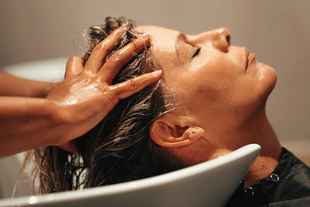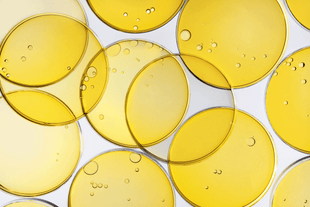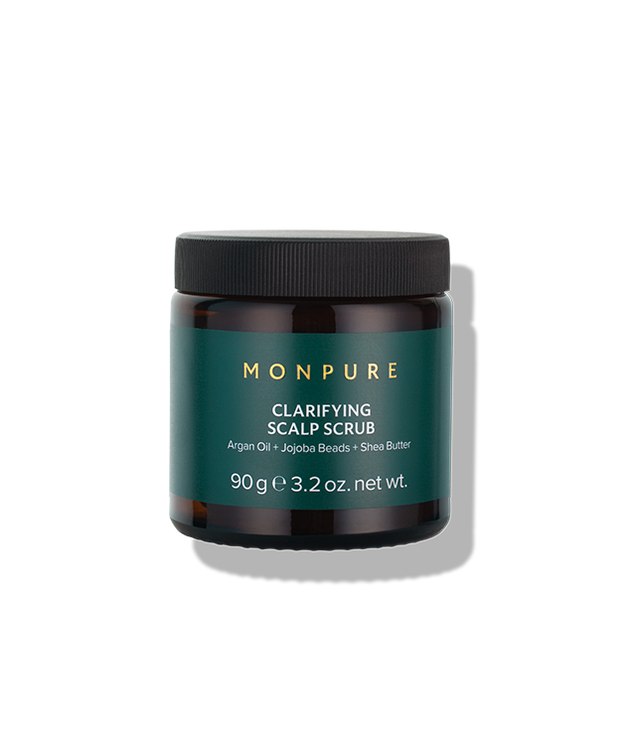
Chinese Medicine for Hair Loss
At MONPURE we know that a healthy, calm scalp and thicker, fuller hair is as much about your lifestyle as it is the products you use. We have always taken a holistic approach to scalpcare and hair health, which is echoed by Ada Ooi, a celebrity facialist, acupuncturist and founder of 001 Skincare. Ooi was brought up in Hong Kong, where her grandfather worked as a pharmacist dispensing both Western medications together with remedies following the principles of Traditional Chinese Medicine (TCM). She incorporates both Western and Eastern approaches in her facial treatments as well as her skincare line. We caught up with her to find out more about the benefits of TCM – in particular for the scalp.
{MONPURE} Hi Ada! So firstly, how did you get into skincare?
{Ada Ooi} I just love anything to do with skin (from a very young age when other girls would be obsessed with Hello Kitty, I would already be at the beauty counters trying different skincare out!) Especially in my teenage years I got a lot of pimples on my forehead. Later on, I worked in advertising. The fast-paced lifestyle of the industry made me experience fluctuations of stress that I noticed seriously affected my skin. I had already trained to be a facialist and aromatherapist, being brought up very closely with my grandpa who owned a pharmacy where he prescribed both Chinese and Western medicine. I saw how his treatments made such a great deal of improvement among his patients, especially people coming in with skin issues in particular, those that were chronic and difficult to treat. That’s what inspired me to forge a career in skincare and acupuncture myself.
{MP} Can you explain what some of the main differences are between Western and Chinese medicine?
{AO} When we diagnose illness in Chinese medicine, it’s really not looking at a local area or a rigid list of symptoms; it’s all linked to your lifestyle and subtle signs that help you actually find what’s happening within the body. The state of the tongue and the pulse rate can be huge indicators of your inner wellbeing.
For example if someone goes to a Western doctor saying that they’ve had a cough for a long time, the doctor would examine the throat and try and work out if there was inflammation in your respiratory tract. They might tell you to take cough syrup to help moisten your throat and feel better. In Chinese medicine when you’re coughing, we’ll ask: “do you cough in the morning or the night?” A morning cough is a sign of having a lot of internal heat and inflammation, while if you cough at night it indicates that there is a lot of coldness and dampness in the body, which creates an excess of fluids and blocks the flow of blood and ‘qi’. Qi is like an engine of the whole body, you need it to push blood flow and ensure all the nutrients to go to the right place.
{MP} TCM and acupuncture are becoming more widespread across the globe. Why do you think this is?
{AO} Our life and our minds are becoming more complicated, that simple medicine can’t explain a lot of things. (How can you explain why your period just suddenly goes crazy?) A lot of time it’s very hormonal and usually stress induced. All you can really do is have a doctor prescribe you a large dose of oestrogen to stop your periods, but it doesn’t treat the cause of your issue next time when stress hits, your endocrine system [which governs hormones] will crash again.
There are also a lot of more unresolved illnesses that are linked to wellbeing you cannot just treat it with Western medicine. That’s why more people are looking to holistic wellness systems such as Ayurveda and Chinese medicine. These are the schools of thought that can treat a lot of symptoms and also bring about a better peace of mind.
{MP} How can Chinese medicine be used to treat certain scalp conditions?
{AO} The skin, whether on the face or the scalp, can be a huge indicator of what is going on inside the body. Scalp acne comes from having too much internal heat within the body, which causes inflammation. If the skin is very red it could mean the digestive system and the lungs aren’t working very well. If someone has dandruff, I would want to know where on the scalp the dandruff is. Basically I’m trying to find out whether your internal body is too ‘dry’ and cold or does it have too much heat? What I would then do is go along the meridian lines related to the lungs, kidney and the liver and would perform acupuncture on those areas.
{MP} What are meridian lines exactly?
{AO} With acupuncture we work with the 12 meridian channels; what this means is that there is a whole network extended from our organs to the skin’s surface. Even if I say that you have liver deficiency it doesn’t mean I’m going to be acupuncturing the area around the liver – the strongest point is actually on the foot! In fact a lot of meridians linked to our stomach, intestines, bladder are underneath our foot, hence why we have therapies in Chinese medicine like reflexology where we solely focus on the feet. (Plus, getting our feet massaged feels good!)
{MP} What are the main lifestyle factors that can compromise our health (and scalp health in particular)?
{AO} One is stress. In TCM it can really induce a lot of blockages around the body especially the liver and the kidney where we create blood, store blood and also where vital nutrients (we call this ‘essence’) are kept. Mental emotions are processed there as well. Whenever you’re stressed liver and kidneys don’t function properly, they can get quite confused and your whole body feels low on energy. The increase in cortisol in your brain also causes hormonal imbalance, which affects the endocrine system working across your stomach, liver, kidney and brain. This can lead to issues such as scalp acne as previously mentioned, together with inflammation of the scalp-skin.
Another very urban problem is over-exercising. When you’re doing a good amount of exercise, there’s good circulation of qi and blood flow and you feel a blissful kind of warmth in your body. But when you start to overdo it and your body is tired, then your organs are tired. I tell my clients a lot, you really don’t need to train seven days a week; some are training to a point where they lose libido and creating a hormonal imbalance. It’s not healthy for them or their relationships!
{MP} Are there any tips and techniques that can help improve our scalp health from a Chinese medicine perspective?
{AO} The more massage the better! Your scalp has a lot of pressure points and this really helps to stimulate them, as well as increase blood flow to the scalp. Not just with the fingers but using a traditional massage tool called gua sha really helps. With gua sha we can knead and press to stimulate pressure points also relieving any muscles are too tense, which can constrict oxygen flow. To really enhance blood flow to the scalp we also need to massage our forehead and neck, both of which can be very tense, and constrict blood flow. In all of my facial treatments, I would do a cranial sacral massage as well.
Also when it comes to haircare, you should avoid silicones at all costs. Silicones on the scalp can accumulate on the skin if you don’t wash your hair properly, blocking pores and causing congestion. Using silicone-free products such as MONPURE’s can benefit your scalp in the long run.
What are some good ingredients for the scalp?
{AO} I love using essential oils. Not only do they smell nice, but in Chinese medicine, all plants are 'medicine' and they're classified with natures of cold, cool, median, warm and hot. For example if your scalp condition is inflicted by heat then we would prescribe cooling ingredients. If your scalp condition is actually inflicted by cold and dampness, you’d be using warming ingredients.
Rosemary and lemongrass [contained in MONPURE’s Follicle Boost Hair Density Serum] are warming ingredients; they gently stimulate blood circulation in order to expel cold and dampness that can create blockage and affect the balance of the skin and sebum levels. Peppermint oil [featured in MONPURE’s Nourish and Stimulate Scalp Mask] is also warming and is used to treat stress-induced blockages in the body, these block heat circulation, causing general sluggishness as well as an oily, itchy scalp and dandruff.
While the green tea extract [also in MONPURE’s Nourish and Stimulate Scalp Mask] has a cooling nature it can cool internal heat accumulated within the body due to stress and a quick temper and promote movement of fluids. Witch hazel astringent [a key ingredient in MONPURE’s Hydrate and Soothe Scalp Serum] is another cooling ingredient, which can help with heat-induced itching, redness and dryness.
Catch up with Ada Ooi’s skincare tips over at @001skincare

















